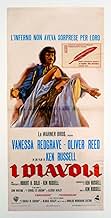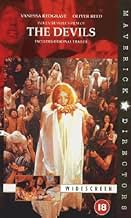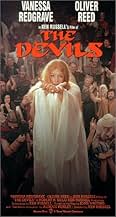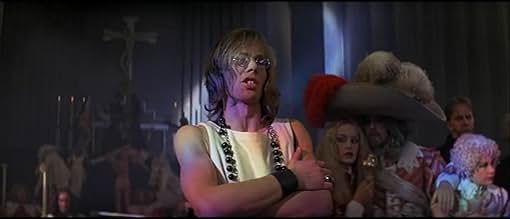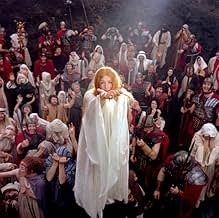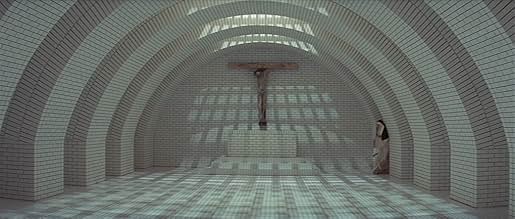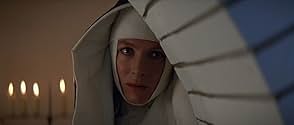AVALIAÇÃO DA IMDb
7,7/10
20 mil
SUA AVALIAÇÃO
Na França do século XVII, o Padre Urbain procurou proteger a cidade de Loudun do estabelecimento corrupto do Cardeal Richelieu. A histeria ocorre dentro da cidade quando ele é acusado de bru... Ler tudoNa França do século XVII, o Padre Urbain procurou proteger a cidade de Loudun do estabelecimento corrupto do Cardeal Richelieu. A histeria ocorre dentro da cidade quando ele é acusado de bruxaria por uma freira sexualmente reprimida.Na França do século XVII, o Padre Urbain procurou proteger a cidade de Loudun do estabelecimento corrupto do Cardeal Richelieu. A histeria ocorre dentro da cidade quando ele é acusado de bruxaria por uma freira sexualmente reprimida.
- Direção
- Roteiristas
- Artistas
- Prêmios
- 4 vitórias no total
Izabella Telezynska
- Sister Iza
- (as Iza Teller)
Tony Allen
- Spectator
- (não creditado)
- Direção
- Roteiristas
- Elenco e equipe completos
- Produção, bilheteria e muito mais no IMDbPro
Avaliações em destaque
When reading the following review, please keep in mind that I saw this film in slightly unorthodox circumstances. Without meaning to sound smug, the screening I attended took place at my University, was chaired by Ken Russell and was of a restored version of The Devils. The missing footage found by the critic Mark Kermode had been spliced back in and the film restored to the director's vision as close as possible. Given that I've never seen the original edit released to cinemas back in the 1970s and that this was only the second time this version had been screened, I think its fair to estimate that the film I'm reviewing will be significantly different to the one that is widely available so please keep that in mind.
Anyway...starting with a bizarre sequence involving an androgynous, foppish King prancing around a theatre stage done up like an Egyptian Queen, Ken Russell's The Devils is a film that over the course of its subsequent hour and forty minutes is liable to offend as many people as it will entertain. The extravagance of the Royal French Court filled with laughing nobles and brown nosing politicians resplendent in the very finest dark ages fashion is soon juxtaposed when the film turns a stark gaze on a rotting countryside filled with pestilence and disease. Maggot infested corpses line the road and the attention is quickly turned on the town of Loudun, where Priest Father Grandier battles not only the plague, but the political schemers who want to demolish the walls. Grandier is such a charismatic public figure however that the politicians are powerless, until they elaborate a plan to have him tarnished with accusations of blasphemy.
Central to this conspiracy is a chapter of Nuns living near by, of whom the hunched Sister Jeanne proves instrumental. Scared of her own sexual desires, the woman is driven mad by her very human nature and soon, the inquisition are knocking on her door and every woman in the building is being tortured and brain washed in the name of Christianity. The evils of religious fanaticism are plain to see, with Michael Gothard's scene stealing extremist Father Barre being the most disgusting example of a Priest you are ever likely to see on film. He batters and humiliates women for the sake of getting his own way and is so inflexible that he will send people to their deaths rather than admit his own fallibility. Controversial scenes abound as Barre's determination brings about nothing but misery, with the brainwashed nuns stripping off and indulging in a mass orgy, culminating in perhaps the most offensive scene when a statue of Christ is pulled down from the chapel walls and used by the nuns as a sexual play thing.
While it may depict blasphemy though, the film itself is not blasphemous and believe it or not, actually celebrates Christianity. It does so through the figure of Grandier (Oliver Reed at his very best), a man whose faith in God is so strong that he will not allow the misled elders of the Church deviate him from his path. He isn't a perfect man and has a weakness for the fairer sex, but he will not bow down to pressure or allow physical pain to weaken his love of God, he is a fine depiction of a Priest of which the Church can be proud.
However, religious sermonising isn't the chief attraction because let's face it, the reason most of us would want to see this movie is because it's controversial. With the aforementioned cavorting on the cross and nun orgies it's not hard to see why and the Inquisition don't exactly come off particularly well either as they stride around the countryside, bullying and torturing and ultimately teaching their flock to hate, not to love. Furthermore, The Devils is possessed (pun very much intended) by a ceaseless, madcap energy that is easy to get swept up in and over the course of the film, you will witness flagellation, nun on nun lesbian action, deranged inquisitors chanting "confess" as they beat people with hammers and (perhaps most bizarrely of all), Oliver Reed duelling with a man using a stuffed crocodile in place of a sword.
Yes, it is a bit uneasy to watch sometimes. Yes, at times it does resemble little more than visual extremity taken to the limit and no its not likely to find it's way into the Pope's DVD collection any time soon. The underlying message is ultimately a pure one though and it has the added benefit of being one of the most insane films you're ever likely to see, as well as making you glad you don't live in the middle ages. If you ever get a chance to see the restored version I couldn't recommend it higher.
Anyway...starting with a bizarre sequence involving an androgynous, foppish King prancing around a theatre stage done up like an Egyptian Queen, Ken Russell's The Devils is a film that over the course of its subsequent hour and forty minutes is liable to offend as many people as it will entertain. The extravagance of the Royal French Court filled with laughing nobles and brown nosing politicians resplendent in the very finest dark ages fashion is soon juxtaposed when the film turns a stark gaze on a rotting countryside filled with pestilence and disease. Maggot infested corpses line the road and the attention is quickly turned on the town of Loudun, where Priest Father Grandier battles not only the plague, but the political schemers who want to demolish the walls. Grandier is such a charismatic public figure however that the politicians are powerless, until they elaborate a plan to have him tarnished with accusations of blasphemy.
Central to this conspiracy is a chapter of Nuns living near by, of whom the hunched Sister Jeanne proves instrumental. Scared of her own sexual desires, the woman is driven mad by her very human nature and soon, the inquisition are knocking on her door and every woman in the building is being tortured and brain washed in the name of Christianity. The evils of religious fanaticism are plain to see, with Michael Gothard's scene stealing extremist Father Barre being the most disgusting example of a Priest you are ever likely to see on film. He batters and humiliates women for the sake of getting his own way and is so inflexible that he will send people to their deaths rather than admit his own fallibility. Controversial scenes abound as Barre's determination brings about nothing but misery, with the brainwashed nuns stripping off and indulging in a mass orgy, culminating in perhaps the most offensive scene when a statue of Christ is pulled down from the chapel walls and used by the nuns as a sexual play thing.
While it may depict blasphemy though, the film itself is not blasphemous and believe it or not, actually celebrates Christianity. It does so through the figure of Grandier (Oliver Reed at his very best), a man whose faith in God is so strong that he will not allow the misled elders of the Church deviate him from his path. He isn't a perfect man and has a weakness for the fairer sex, but he will not bow down to pressure or allow physical pain to weaken his love of God, he is a fine depiction of a Priest of which the Church can be proud.
However, religious sermonising isn't the chief attraction because let's face it, the reason most of us would want to see this movie is because it's controversial. With the aforementioned cavorting on the cross and nun orgies it's not hard to see why and the Inquisition don't exactly come off particularly well either as they stride around the countryside, bullying and torturing and ultimately teaching their flock to hate, not to love. Furthermore, The Devils is possessed (pun very much intended) by a ceaseless, madcap energy that is easy to get swept up in and over the course of the film, you will witness flagellation, nun on nun lesbian action, deranged inquisitors chanting "confess" as they beat people with hammers and (perhaps most bizarrely of all), Oliver Reed duelling with a man using a stuffed crocodile in place of a sword.
Yes, it is a bit uneasy to watch sometimes. Yes, at times it does resemble little more than visual extremity taken to the limit and no its not likely to find it's way into the Pope's DVD collection any time soon. The underlying message is ultimately a pure one though and it has the added benefit of being one of the most insane films you're ever likely to see, as well as making you glad you don't live in the middle ages. If you ever get a chance to see the restored version I couldn't recommend it higher.
I can't believe that someone still hasn't released a definitive version of this film on Blu Ray. I used to work in a video store and the copy we had was cut up so badly that the plot was incomprehensible. I own a DVD that seems to probably be uncut but the picture is faded and the colors aren't very bright. Also, the sound pretty bad. However, as far as I know it's the only uncut version out there. Hell, The Criterion Collection released Salo and that's miles more depraved and offensive (watch it though) than this film. I was raised Catholic and the whole film is blasphemous. When I first read Marquis de Sade's The 120 Days of Sodom (I almost couldn't finish it), the book on which Salo is based, I said to myself alot that I was going to go to Hell for reading this. The Devils gave me the same feeling. I haven't been a practicing Catholic for 45 years but those teachings are still ingrained in your subconscious. Visually, this is an absolutely beautiful film. The stark black and white colors of Loudoun and the Abby have never been duplicated as far as I know. The scene where the hysterical nuns simulate sex with Jesus on a giant cross are a bit much. It brought back the I'm going to hell for watching this. The violence in parts is still shocking even though it's 50 years old. The only flaw is Ken Russell's insistence of putting corny, un funny humor in his films. If there was ever a film that didn't need any humor it's this one. It's here though and it detracts from the flow of the film for no good reason. That's a small quibble though since the film is pretty much a masterpiece. The performances are flawless. It's Oliver Reed's best performance and Vanessa Redgrave is unforgettable as the deranged Sister Jeanne (I hope that's how it's spelled). In fact everyone is absolutely top shelf (except maybe the guy who plays the king and brings the awful humor to the movie). So, Criterion please release a version of this. Everyone else watch it without a doubt unless you hate violence, depravity and general unpleasantness. If you're a practicing Christian (especially Catholic) skip it too unless you want that I'm going to Hell feeling . Ken Russell's best film and one of the best films of all time. Watch it!
British director Ken Russell's adaption of Aldous Huxley's book "The Devils of Loudun" is one of the most origional, controversial and daring films ever made. The film takes place in 17th-century France and centres on the hypocritical and licentious behaviour of debauched priest Father Urbain Grandier, brilliantly played by Oliver Reed. A second plot strand involves the humpbacked nunn Sister Jeanne, played by Vanessa Redgrave, who, along with her fellow nuns, is obsessed with Grandier. When the nuns become seemingly possessed, disgruntled representatives of the Catholic Church and corrupt officials move in and seize their opportunity to get rid of Grandier.
The film gets off to an excellent start, gradually building up the tension and highlighting the flaws within the Catholic religion. However the middle section involving the possession of the nuns is far too theatrical and over-the-top and the action becomes weighed down by the overbearing performance of Michael Gothard as Father Barre and Derek Jarman's lurid sets. The final section of the film, however, is mightily impressive and well-scripted and benefits hugely from Oliver Reed's committed performance.
While Vanessa Redgrave impresses in the role of Sister Jeanne this is Oliver Reed's film and a performance which proves he was a great actor and not just a great hellraiser. This film illustrates that he is easily the equal of his contemporaries including Caine, Connery, Harris and Finney.
While director Ken Russell's films can range from the very good to the absolutely awful "The Devils" is without doubt his best. This is perfect material for Russell to work with and the ideal outlet for his unique vision. Russell was part of the new breed of controversial directors who emerged in the late 1960s and 1970s who courted controversy with images of sex, nudity, violence and shocking images. "The Devils" is no exception and while it will by no means be to everyone's taste it should be commended for its daring take on the hypocritical side to religion and for helping to pave new ground in cinema.
The film gets off to an excellent start, gradually building up the tension and highlighting the flaws within the Catholic religion. However the middle section involving the possession of the nuns is far too theatrical and over-the-top and the action becomes weighed down by the overbearing performance of Michael Gothard as Father Barre and Derek Jarman's lurid sets. The final section of the film, however, is mightily impressive and well-scripted and benefits hugely from Oliver Reed's committed performance.
While Vanessa Redgrave impresses in the role of Sister Jeanne this is Oliver Reed's film and a performance which proves he was a great actor and not just a great hellraiser. This film illustrates that he is easily the equal of his contemporaries including Caine, Connery, Harris and Finney.
While director Ken Russell's films can range from the very good to the absolutely awful "The Devils" is without doubt his best. This is perfect material for Russell to work with and the ideal outlet for his unique vision. Russell was part of the new breed of controversial directors who emerged in the late 1960s and 1970s who courted controversy with images of sex, nudity, violence and shocking images. "The Devils" is no exception and while it will by no means be to everyone's taste it should be commended for its daring take on the hypocritical side to religion and for helping to pave new ground in cinema.
Ken Russell is one of those filmmakers whose work you can immediately identify. Whether your first was "Altered States" or (like me) "The Devils," you learn early on that if Mr. Russell's name is listed as director and/or writer, you can expect to be at least a little disturbed.
"The Devils" is, in my humble opinion, one of the best films ever made. I wish I hadnt been born so late because I can imagine how truly intense an experience it must've been to view "The Devils" in theater.
This film is the only film I've ever seen, regardless of genre, to take the viewer into the pit of hell and to hold her/him there unrelenting, uncompromising, and to make the viewer feel as s/he has actually experienced hell. I can only imagine how much difficulty Mr. Russell must have had when MPAA members saw this film. It's bleak, horrifying, shocking, disgusting and thoroughly delicious. Aldous Huxley (the author of the book on which this film was based) would have been proud to see that his true story of a Satanic Catholic church translated very well to film.
One last thing: I have never really been able to sit through the entire film since the first time I saw it. That is, odd as it sounds, extreme praise. What kind of hell would it be if I could sit comfortably?
Thank you, Ken Russell!
"The Devils" is, in my humble opinion, one of the best films ever made. I wish I hadnt been born so late because I can imagine how truly intense an experience it must've been to view "The Devils" in theater.
This film is the only film I've ever seen, regardless of genre, to take the viewer into the pit of hell and to hold her/him there unrelenting, uncompromising, and to make the viewer feel as s/he has actually experienced hell. I can only imagine how much difficulty Mr. Russell must have had when MPAA members saw this film. It's bleak, horrifying, shocking, disgusting and thoroughly delicious. Aldous Huxley (the author of the book on which this film was based) would have been proud to see that his true story of a Satanic Catholic church translated very well to film.
One last thing: I have never really been able to sit through the entire film since the first time I saw it. That is, odd as it sounds, extreme praise. What kind of hell would it be if I could sit comfortably?
Thank you, Ken Russell!
10degelb
Cited by director Alex Cox and critic Mark Kermode as one of the ten greatest achievements in cinema of all time, The Devils is based on a true story set in France in 1634 about the evils of the union of church and state controlled by power hungry, perverse men who prey on faith and fear, and one priest, Father Grandier, who tries to protect the liberties and walls of his city, Loudun.
This film was met with great controversy and opposition due to its contents and depictions of blasphemy. Hardly available today, the current VHS release suffers from trigger happy censors with no desire to leave the plot intact. The video translation is appalling, with only a fraction of the resolution and quality of film, and the fullscreen framing mauls at least 60% of the compositions. If you can attain this on widescreen on DVD, you are a lucky person. Unfortunately, as is reflected by another comment on this board, most people see the crappy version and judge the film based on that.
This film was met with great controversy and opposition due to its contents and depictions of blasphemy. Hardly available today, the current VHS release suffers from trigger happy censors with no desire to leave the plot intact. The video translation is appalling, with only a fraction of the resolution and quality of film, and the fullscreen framing mauls at least 60% of the compositions. If you can attain this on widescreen on DVD, you are a lucky person. Unfortunately, as is reflected by another comment on this board, most people see the crappy version and judge the film based on that.
Você sabia?
- CuriosidadesDerek Jarman's sets are modeled on the sets of Fritz Lang's Metrópolis (1927). Ken Russell wanted to avoid the clichéd look of period films and insisted on anachronistic, even futuristic, design. Russell's guidance to Jarman was that it should echo the 'rape in a public toilet' line from the Huxley novel that inspired the film.
- Erros de gravaçãoEarly in the movie when Urbain Grandier (Oliver Reed) is seen grooming his hair. It is a close-up of him supposedly looking at a mirror in the upper left hand corner of the screen, behind the viewer. Obviously there is no mirror as he consistently misses combing the more egregiously messed up parts of his hair and instead repeatedly combs the portions that are already groomed. In fact when he is done, his hair is still messed up.
- Cenas durante ou pós-créditosAt the start of the film: "This film is based upon historical fact. The principal characters lived and the major events in the film actually took place."
- Versões alternativasIn 2012 the BFI persuaded Warners to allow them to release the film on video in the UK. Warners refused to allow the director's cut at all and would only allow the BFI to release the original 'X' certificate version on DVD. Warners refused permission to allow a hi rez release. The BFI produced a superb DVD transfer for the first time in its proper 2.35:1 ratio. The Channel 4 documentary 'Hell on Earth' was included but the 'Rape of Christ' sequence was removed. They also cut a line of dialogue when one of the actors refers to Warners as a bunch of 'c**ts'. Before this in the USA the 'unrated' version appeared as an upcoming release complete with sleeve art. 24 hours later Warners stopped the release!
- ConexõesFeatured in Omnibus: Russell's Progress (1971)
- Trilhas sonorasBourrée d'Avignon
from Secretum musarum (1615)
Music by Nicolas Vallet.
Played as the king's dance in the opening.
Principais escolhas
Faça login para avaliar e ver a lista de recomendações personalizadas
- How long is The Devils?Fornecido pela Alexa
Detalhes
- Data de lançamento
- Países de origem
- Idiomas
- Também conhecido como
- Los demonios
- Locações de filme
- Empresa de produção
- Consulte mais créditos da empresa na IMDbPro
Bilheteria
- Faturamento bruto mundial
- US$ 2.293
- Tempo de duração
- 1 h 51 min(111 min)
- Mixagem de som
- Proporção
- 2.35 : 1
Contribua para esta página
Sugerir uma alteração ou adicionar conteúdo ausente

![Trailer [EN]](https://m.media-amazon.com/images/M/MV5BYjgxZTMwNzYtYmE4Zi00ZDNjLWJkZjUtNTQ1NGQ1ZWRmMDAwXkEyXkFqcGdeQXRyYW5zY29kZS13b3JrZmxvdw@@._V1_QL75_UX500_CR0)

